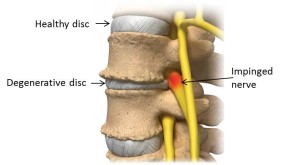Could Your Back Pain Result from Degenerative Disc Disease?
Degenerative disc disease is one of the most common causes of lower back pain. It’s also one of the most misunderstood.
Degenerative disc disease refers to the pain, and sometimes weakness or numbness, that results from a degenerated disc in the spine. This may sound simple, but the diagnosis can also be confusing for patients.
Being told you have “degenerative disc disease” can be scary because it sounds like a progressive, threatening disease. But it’s not technically a disease, and it is not strictly degenerative.
The word “degenerative” sounds like the symptoms will get worse with age. However, the term does not apply to the symptoms. It describes the process of the disc degenerating over time. In fact, the pain from degenerative disc disease does not get worse and even gets better with enough time.
The term “disease” is another source of confusion. Degenerative disc disease is not really a disease. It is a degenerative condition that at times can produce pain from a damaged disc.
Disc degeneration is actually a natural part of aging, and all people will show signs of changes in their discs with a greater or lesser degree of degeneration. All people, however, will not develop symptoms. Degenerative disc disease varies in its nature and severity.
The pain associated with degenerative disc disease is thought to stem from two main factors:
1. Inflammation
Inflammation can be caused by by the proteins contained within the disc space and can cause pain.
If the affected disc is in the lumbar region, the low back pain can radiate into the hips and travel down the back of the leg, possibly even into the foot and toes.
If the affected disc is in the cervical region, the neck pain may be local or may radiate into the arm, shoulder and possibly into the hand.
2. Abnormal micromotion instability
If the annulus, or the outer rings of the intervertebral disc, degenerates and wears down, it is not as effective in resisting motion in the spine. This condition is called “micromotion” instability since it is not associated with gross instability.
Inflammation and micromotion instability can cause lower back or neck muscle spasms, which is the body’s attempt to stabilize the spine. It is simply a reflex, but the body’s response of muscle spasm is not necessary for the safety of the nerve roots — and it can be very painful!, it can be quite painful.
The muscle spasms associated with the instability are thought to cause the flare-ups of intense pain often associated with degenerative disc disease.
Are you experiencing any of the symptoms we’ve covered in this blog post? Degenerative disc disease should be treated by an experienced spine specialist. Please get in touchwith Dr. Sharma to make your appointment today.

Categories
Archives
Contact Dr. Mudit Sharma
Phone: (571) 921-4877
Toll Free: (855) 774-6334
Monday – Thursday: 8am – 4pm
Friday: 8am – 2pm
Loudoun County
24430 Stone Springs Blvd, Suite 250
Dulles, VA 20166
Spotsylvania County
4604 Spotsylvania Parkway, Suite 300
Fredericksburg, VA 22408
Prince William County
9625 Surveyor Ct. Suite 320
Manassas, VA 20110

